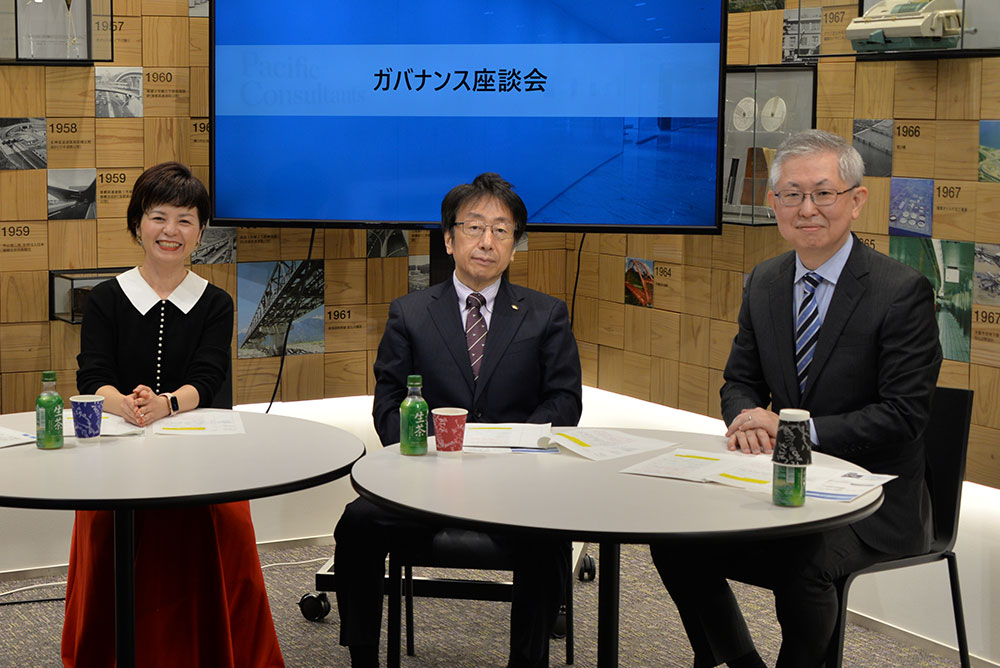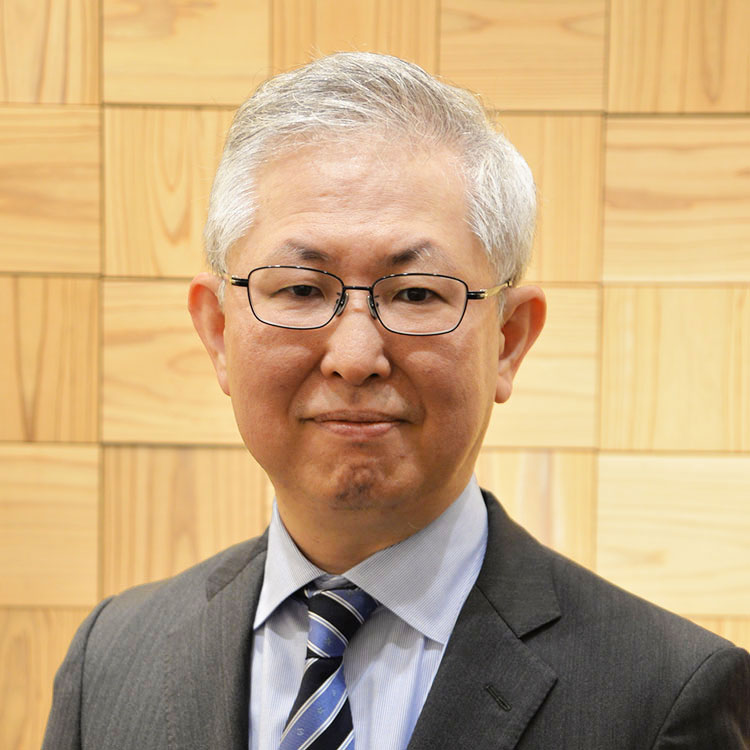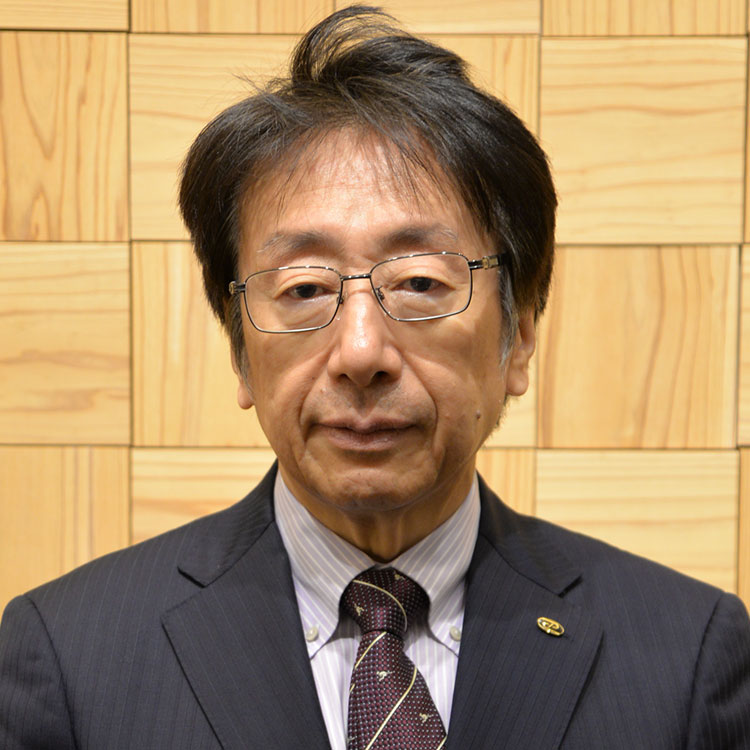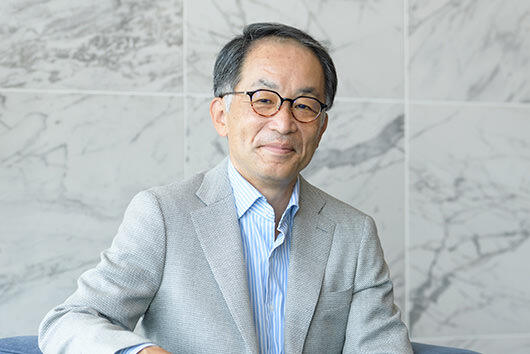At PACIFIC CONSULTANTS, the management team is working together to reform governance in order to adapt to the dynamic changes in society and achieve PACIFIC CONSULTANTS GROUP's vision of "Producing the Future." Through governance reformation, the company has reviewed its Executive Officer System and delegated authority in order to make management's decision and execution faster and more effective. In addition, as an unlisted company, the company has newly established a Voluntary Nomination and Remuneration Committee as a healthy "self-check function for management." We have talked to three Outside Director who are driving these reformation together with us, Ryota MIURA, Sakon UDA, and Makiko OTSUKA, about the current situation of the company's governance reformation and PACIFIC CONSULTANTS' future as it strives for "Change and Growth."
INDEX
- What is the purpose of governance reformation?
- What is needed for PACIFIC CONSULTANTS GROUP's "Change and Growth"?
What is the Purpose of Governance Reformation?
-When you started the governance reformation, the management team was asked, "What kind of company do you want PACIFIC CONSULTANTS to be? Does everyone agree on that?" What were your thoughts on this?
MIURA: The starting point is why PACIFIC CONSULTANTS has the Board of Directors. You may think it's natural to have one, but since we are an unlisted company, we don't need to have one. There is also no need to select Outside Director. However, if we have the Board of Directors, inviting Outside Directors, and considering medium- to long-term corporate strategies at the Board of Directors, we wanted to confirm again what kind of company PACIFIC CONSULTANTS wants to be, by the people in charge of business execution. It's not about what we want to do, but what the board members and employees want to do with this company, and that's where we start. I thought it would be difficult to answer because it was such a straightforward question, but I started from there.
UDA: What I wanted everyone to think about was what governance is, and why it is necessary to reform the governance now. Corporate Group Governance is not just about putting some formality into place, but is an important driver for changing a company to be better, and the governance reformation is existing for creating value. I think this is important for all organizations, not only listed companies but also educational institutions such as universities and also unlisted companies. In particular, unlisted companies are asked whether they are moving toward the goals they have set for themselves while fulfilling their significance of existence. To do this, I thought it was essential that the management team and members of the organization have a common understanding of where they are heading to, why, what for, and for whom they exist.
-It seems that you place a great importance on "management team having a common understanding".
OTSUKA: Since becoming a board member of our company, the first thing I've been paying attention to is the state of communication within the company. Having participated in the Board of Directors, management study group, and governance working group (working group for governance reformation by management team), I've noticed the importance of "speaking one word of sincerity." Through repeated discussions in the working group, I feel that the management team has been putting into practice that "speaking one word of sincerity" about the significance of existence of our company, and what value it provides to customers and society. If the "not being able to speak one word of sincerity" accumulates in the course of work, the company will not be able to show its true potential when it is in a crisis or when it needs to expand further, so I think this is an important perspective.
-How does governance contribute to recovery from a crisis and further growth?
UDA: Governance may sound like something far away to many people, but it is not. First of all, please think of it as something that is necessary for an organization to function healthily. It is something that has a great impact on each and every employee. It is not something that only for the Director/Board Member or top management need to consider. Looking back on my experience, I think the important thing was that the employees change their previous mindset.
I once played a part in governance reform as Outside Director at another company for 11 years. Based on my experience there, I believe that in order to recover from a crisis, it is important not only to reform the governance structure, but also for employees to think together and work in the same direction to change the company together. Governance is not something that only the top management does, and it is not a matter of how Board of Directors should be composed, how many Outside Director there should be, or what the gender composition should be. Each employee should think about and act on the basis of, "Is my awareness and behavior okay? Will it damage the value of the entire organization?" Effective governance is about constantly creating a situation in which people are checking their own actions. To achieve this, it is important for managers and Director/Board Member to take the initiative in making changes and checking themselves.
MIURA: As we discussed, we came to the common understanding that "the company must continue to grow." A car needs an accelerator to move forward. However, there is no such thing as a "car" that only has an accelerator; at the same time, it needs a brake. A braking device called governance is also necessary for the growth of the company. As an unlisted company, the grip of shareholders is inevitably weak, so we make the car equipped with brakes. Naturally, the Board of Directors or top management, and top executives must be disciplined to govern the entire company. I think we arrived at the conclusion that the company needs to be governed in order to provide the value we aim for, and that governance is necessary for that purpose.
As an Outside Director, I always want to be "the outsider who knows the most about the company." When a scandal occurs, one of the most common phrases we hear is "Our company has always been like this." I call this "our company's common sense, the world's nonsense." Since we are "the outsiders who know the most about the company," I always want to check that we are not "our company's common sense, the world's nonsense."
UDA: Ensuring diversity by including Outside Directors is also important in governance. In reality, decisions are often made among homogeneous people. However, when homogeneous people discuss something, even if you ask the person next to you for their opinion, they will say, "I think so too." This is the "trap of homogeneity." In particular, if you are an engineer working in the same technical field within the same industry, you will not be able to make decisions based on different ways of thinking. I think that it is necessary to be aware of this role as as an Outside Director.

What is Needed for PACIFIC CONSULTANTS GROUP's "Change and Growth"?
-How should management change going forward to achieve "Change and Growth"?
OTSUKA: I think that the future management team should change from "do" to "be". "To do" means "action" to do something. I think that our management team is probably good at achieving something by accumulating "to do". On the other hand, management team need to play a different role from the field. I told them that "to be" - how a management team should be and what they should communicate - will be very important. It is important to give instructions on "to do" from the top down, but I think that it is also necessary to think about what kind of "to be" message to send and what kind of PACIFIC CONSULTANTS will be embodied outside the company. It is important to accelerate the process of thinking about and sending out "to be".
-Our company has been conducting organizational and human resource management trainings starting in October 2023, and we continue to learn how each organization can set unwavering goals and north stars to help them grow.
OTSUKA: I think what's important at that time is for employees to proactively take the time to see what's going on outside the company, rather than just thinking about what's going on inside the company. I think our company can grow even more if employees think more and more about how they can get in touch with the outside world, what's happening in the world and society, and how global companies are operating.
-As part of our governance reformation, we have established an (Voluntary) Nomination and Remuneration Committee from 2024. What is the aim of this?
MIURA: Our company could be listed, but we have chosen to remain unlisted. If that is the case, I would like to see the company make the most of the benefits of being unlisted. Listed companies have a lot of pressure for short-term performance. However, our company has the advantage of being easier to implement medium- to long-term measures than other companies. If the management team is united and has a vision of what kind of company they want to be, no one will interfere. I would like everyone to think about what they can do by being unlisted, such as putting social contribution first and employees first, and to realize it. On the other hand, since there are some areas where we can be lax because we are unlisted, I think we should aim for healthy development while having a self-checking function. One of these self-checking functions is the (Voluntary) Nomination and Remuneration Committee, which should have an outside perspective and the ability to make recommendations without bias when it is time to replace even the President and Representative Director.
UDA: Since it is difficult for external stakeholders to check unlisted companies, they need to consciously create a check function for themselves. One way to do this is to establish a nomination and remuneration committee that brings an outside perspective to the nomination and evaluation of management. In addition, it is necessary to create an environment where management is constantly thinking, "Is this okay?", such as by getting feedback from the diverse perspectives of Outside Directors on important management decisions.
Furthermore, if you are working for a non-listed consulting company, you can always work with your customers in mind. However, in that case, I would like you to think carefully about who your customers are. In our case, many of our direct clients are government agencies. So, is the Ministry of Land, Infrastructure, Transport and Tourism your customer? The source of funding for infrastructure development is tax money. It is important to consider what value you provide to taxpayers, that is, those who support the infrastructure and those who use it. I would like you to always approach your work with your "customer's customer" in mind.
OTSUKA: What you should keep in mind at that time is to ensure a stress-free work environment. When you need to make the right decisions or check yourself, if you are stressed or not working in a healthy way, you tend to think, "This is okay," or "This may be against the rules, but it's been done before, so it's okay."
In order to make the right decisions, it is necessary to keep the organization as healthy as possible, and the question is how much awareness one can devote to this. I think this is an unavoidable path not only for managers, but for each and every employee.
-Finally, could you all give us your comments on what you think is needed for PACIFIC CONSULTANTS GROUP to "Change and Growth" in the future?
OTSUKA: In a word, it's dialogue. In order to ensure that this major transformation does not end up being just a pipe dream, I think it is important to communicate diagonally and above and below, between management and employees, between superiors and subordinates, between department A and department B, etc., while taking into account the ever-changing social and business environments. People do not act on theory alone. It is necessary to be convinced intellectually, and also to face the same direction emotionally and mentally. I would be happy if governance could also help create an environment where each employee can think together about what they want to do with PACIFIC CONSULTANTS and what they want to achieve with this company.
UDA: It's about aligning what you say with what you do. Management puts all sorts of things in writing and communicates them to employees, such as the company's purpose and medium-term management plan, saying that they will do it and that employees should do it too. However, if there is a discrepancy between what management says and what they actually do, it will greatly lower the motivation of the employees.
And I would like to reiterate that governance reformation is not just for the Board of Directors and executives. Ultimately, it is a transformation that will enable employees to think more freely and take on new challenges, so that we can become a company that contributes to the happiness of those who use our infrastructure. If each of you approaches your work while asking yourself why and what your purpose is in working for our company, I believe we will become an even better company.
MIURA: I think that passion is necessary for future growth. PACIFIC CONSULTANTS has always been a passionate company, not bureaucratic. What must PACIFIC CONSULTANTS accomplish? What do you want to accomplish with PACIFIC CONSULTANTS? I would like you to communicate this to the outside world. At the venue for this roundtable discussion, Legare, there were photos of the company's history since its founding, which I found very interesting, but there is a blank space for 2030. I would like employees to fill that blank space with the thoughts of "I want to make the company to be like this."
-Thank you very much. As we move towards becoming a 100-year-old company, I hope that the management team and employees will continue to work together to promote "Change and Growth."









